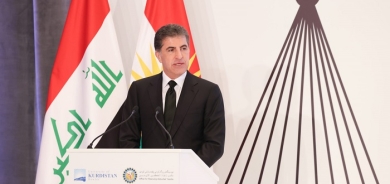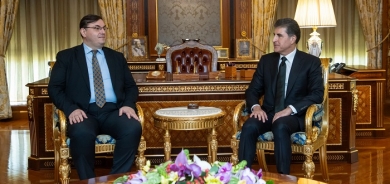Turkey Says It Struck Kurdish Forces in Syria

ISTANBUL—Turkey said it attacked Kurdish forces in Syria backed by the U.S., potentially setting the stage for a new fight with the Obama administration as it looks at increasing its ties with the Kurdish militants leading the most effective fight against Islamic State.
In a television interview Monday, Prime Minister Ahmet Davutoglu said Ankara carried out two strikes on the Kurdish YPG group as a warning to the fighters against expanding their control into parts of Syria that Turkish officials hope will serve as a safe zone for returning refugees—and as a base for Syrian militants backed by the government in Ankara.
“If the YPG moves to the West of river Euphrates, we will hit it,” Mr. Davutoglu said in the interview on Turkish television. “We have already hit two times.” Turkey considers the river a “red line”.
Kurdish militants in the region said Turkish forces over the weekend struck Kurdish fighters controlling the strategic towns of Kobani and Tal Abyad in Syria, along Turkey’s border.
Mr. Davutoglu didn’t say which Kurdish targets were struck or when the attacks took place. But in acknowledging Turkish action against the YPG, the prime minister made clear that Turkey will oppose American efforts to deepen ties with Kurdish militants in Syria.
U.S. officials said they couldn’t confirm that Turkey had struck the Kurdish targets.
“In the meantime, we are working with Turkey, as well as many different groups within Syria, including Kurdish and Arab groups, to defeat ISIL,” said Pooja Jhunjhunwala, a State Dept. spokeswoman. “We will work with all parties to calm tensions so that we can focus on the common threat.”
A senior Kurdish official, Idres Nassan, said the YPG hadn’t made any moves in the region without coordinating with the U.S.-led coalition. “Our forces have not moved from the east bank of the river since they took over Tal Abyad [in June],” he said.
In July, the YPG accused Turkey of shelling its areas in northern Syria, including a civilian village, immediately after declaring it had launched air strikes against Islamic State in the region. Turkish officials at the time denied deliberately attacking YPG targets, saying they “remained outside the scope of the current military effort”, and promised to investigate any out-of-target damage caused by Turkish operations.
Turkey’s growing concerns about the Kurdish role in the fight against Islamic State pose a fresh challenge for the Obama administration as it tries to develop a revised strategy against the militant group and contain the entry of Russian forces now carrying out airstrikes against Syrian militants to help President Bashar al-Assad.
After scrapping a failed plan to train thousands of Syrian rebels to fight Islamic State, the U.S. has started dropping military supplies to Arab fighters in northern Syria who are aligned with the Kurdish forces.
Turkish leaders have warned U.S. officials that they oppose increased cooperation with Kurdish YPG fighters, who they consider to be terrorist forces aligned with Kurdish militants known as the PKK, who are embroiled in a direct conflict with Turkey.
“Those who provide arms to the PKK, or the YPG, should know that those will end up not serving peace in the region,” Omer Celik, a spokesman for Turkey’s long-dominant Justice and Development Party, told reporters this month.
The U.S. has worked with Turkey to contain Kurdish territorial ambitions by agreeing not to let YPG forces move west of the Euphrates River into the area in which Turkey hopes to create a safe zone.
But the U.S. is quietly stepping up its cooperation with the YPG by launching a program to provide more weapons to a loose coalition of Arab and Kurdish forces in northern Syria.
Two weeks ago, the U.S. military dropped the first 50 tons of ammunition and supplies for Arab fighters in northern Syria. The Pentagon said at the time that none of the equipment had been given to Kurdish forces. Privately, however, administration officials said that they had little concern about the military supplies being shared with the YPG.
The deepening U.S. cooperation with the YPG in Syria set the stage for a military response from Turkey, which is worried that emboldened Kurdish leaders will step up their demands for an independent state in Kurdish dominated areas straddling parts of Turkey, Syria, Iraq and Iran.
Kobani is a predominantly Kurdish town that became a rallying cry for the YPG last year as they persuaded the U.S. to aid their cause by launching air strikes that helped push Islamic State out of the town on the Turkish border. Tal Abyad is a predominantly Arab town that Kurds recently absorbed into the area they hope will one day become an independent state, according to Kurdish forces.
Turkey’s President Recep Tayyip Erdogan said Saturday that his country wouldn't stand by as Kurdish forces expanded their areas of control.
“All they want is to seize northern Syria entirely,” Mr. Erdogan said. “We will under no circumstances allow northern Syria to become a victim of their scheming. Because this constitutes a threat for us, and it is not possible for us as Turkey to say ‘yes’ to this threat.”
The Wall Street Journal















